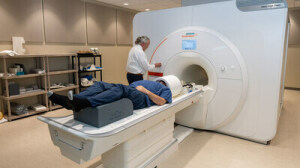by
John R. Fischer, Senior Reporter | March 29, 2024

Siemens Healthineers' MAGNETOM Terra.X 7T MR scanner (Photo courtesy of Auburn University)
With a green light from the FDA now secured, Siemens Healthineers has installed its $9 million MAGNETOM Terra.X 7T MR scanner at Auburn University Samual Ginn College of Engineering’s Neuroimaging Center in Alabama for clinical and research purposes.
It is the first MR system with a clinical eight-channel parallel transmit architecture, providing greater image clarity for detecting extremely subtle pathological details, and also the first clinically approved 7T MR scanner to be installed in a field setting, making it accessible to both researchers and the public.
Further amplifying quality is the company’s hardware and software, Ultra IQ Technology, which provides high-field strengths for darkening image impressions and showing findings at scan edges more clearly.



Ad Statistics
Times Displayed: 174448
Times Visited: 3180 For those who need to move fast and expand clinical capabilities -- and would love new equipment -- the uCT 550 Advance offers a new fully configured 80-slice CT in up to 2 weeks with routine maintenance and parts and Software Upgrades for Life™ included.
The solution is primarily designed for brain and knee imaging and will be used at Auburn to evaluate epilepsy, multiple sclerosis, and other disorders, said Thomas Denney, director of the neuroimaging center and the Bruce Donnellan and Family Professor in the department of electrical and computer engineering.
"With our old 7T system, if we did an MR scan of the brain in certain regions, you wouldn't receive uniform coverage. That's because we had only one transmit channel, like a flashlight inside a large room with only one beam,” he said. “By comparison, our new Terra.X 7T provides us with eight beams of light that illuminate the brain and provide a more uniform image.”
The scanner is the predecessor to the MAGNETOM Terra system, released in 2017, and comes with syngo MR XA60A software. The technology includes Deep Resolve capabilities for deep-learning-based image reconstruction. The company has trained the software specifically with 7T data to align with the scanner’s speed and image resolution.
Additionally, its sodium imaging coils allow clinicians to measure how much sodium is in the brain in order to identify abnormalities and study electrical signaling, and its high-performance gradient system enhances diffusion and functional MR imaging. It can also measure phosphorous in muscle tissue.
At Auburn, the system is housed in the 45,000-square-foot Thomas Walter MRI Research Building, named in honor of Auburn Engineering alumnus Thomas Walter. The university expects nearby hospitals with patients whose conditions cannot be identified on standard 3T MR scanners to refer them to undergo scanning at the facility.
Plans are already underway for its research use as well, including for studies on post-traumatic stress disorder, cognition and emotions, muscle and brain energy production, brain disorder detection with AI, and gene therapy.
"In addition to being able to provide opportunities for researchers like myself to study disorders and even brain connectivity at a new level, this new scanner also contributes to the fact that we can clinically assess people in different ways," said Jennifer Robinson, principal investigator at the Auburn University Cognitive & Affective Neuroscience Laboratory and a professor in psychological sciences in the College of Liberal Arts. "It has tremendous impact for folks with epilepsy or Parkinson's, where we can do imaging that we couldn't do before.”

